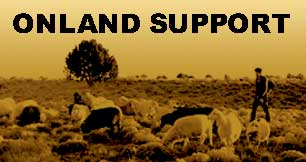Kee Watchman Statement – UN Sub-Commission on the Promotion and Protection of Human Rights
July 26, 2002 by pathfinder
Filed under Voices from the Land
COMMISSION ON HUMAN RIGHTS
Sub-Commission on the Promotion and
Protection of Human Rights
Working Group on Indigenous Populations
Twentieth session
22-26 July 2002
Item 4. b
(b) Indigenous Peoples and their right to development including participation in development affecting them
Statement by Kee Watchman of Cactus Valley/Red Willow Spring Sovereign Community, Big Mountain, Arizona
Thank you Mr Chairman, distinguished members of the Working Group and indigenous brothers and sisters.
The very last traditional Dine’h (Navajo) who are still remaining on their ancestral homeland at Cactus Valley/Red Willow Spring, Big Mountain area, are continuing to face relocation from their land because the US
government, the Navajo and Hopi tribal governments and Peabody Energy Group want to extend the coal mining on the so-called HPL (Hopi-Partitioned-Lands) in the future.
The Hopi Tribe and Peabody Energy are working on a proposal to build a pipeline from Lake Powell to replace 1.3 billion gallons a year in groundwater used in a slurry line that carries coal to a power plant in Laughlin,
Nevada. This pipeline would keep a coal mine operating and eventually fuel a new power plant on Black Mesa, Big Mountain area. This also exemplifies what the traditional Elders always knew, that economic interests in the coal resources on their lands lie at the heart of the relocation issue.
Dine’h and Hopi communities are experiencing water shortage and often have to travel for miles to access drinking water as the natural water resources are threatened. Peabody Energy uses 1.3 billion gallons of water a year for the slurry line but claims that this does not permanently damage the natural aquifer and that surface springs are shrinking due to drought. The water shortage affects the communities in many ways. Water from the natural springs is sacred to the people and provided sacred water for ceremonies as well as drinking water. Medicinal herbs used in ceremonies and endangered species are disappearing due to the water crisis.
The pipeline would also provide water for the Navajo and Hopi communities and offer some kind of protection of the natural aquifer. However, the water coming from Lake Powell is not safe as it is exposed to pollution. This water would be pumped into the communities to be used as drinking water that way causing health problems in many ways for the communities.
Furthermore, if the communities agree to the pipeline, this means that they also agree to the further exploitation of the coal resources and a coal-fired power plant on Black Mesa, which would become possible with this alternate source of water.
According to Peabody Energy the mining on Black Mesa injects around 2 million USD each week into the Hopi and Navajo governments. The coal coming from the ancestral homeland of the Dine’h and Hopi communities is used to light up big cities like Las Vegas and make big business there. However, the traditional communities mostly affected by the mining operations have no share of the benefits made from the coal resources on their ancestral lands. There is no health clinic, no proper school, no road improvements, no proper housing and no facilities for community gatherings.
The traditional communities are not participating in the negotiations regarding the proposals for the pipeline, the continuation of the coal mining and the construction of a power plant on Black Mesa. They are not being
consulted and provided with all the information to make their own decisions based on the principle of free and prior informed consent.
In conclusion, Mr. Chairman and members of the Working Group, the communities of the Big Mountain area have requested the continuous support from this Working Group and that Special Rapporteurs come to visit our land and report on our situation. It is very important that this Working Group continues its work as a fora open to all indigenous peoples in addressing the serious problems faced by indigenous peoples. There is a need for further standard setting activities to resolve the problems of the indigenous peoples of the Big Mountain area and others that have come to this Working Group since its beginning twenty years ago.
It is our hopes and aspirations that member states adhere to what the Working Group has accomplished in these past two decades and we look forward to participating in this unique UN body addressing and finding the way forward in regaining our human rights and dignity.
All our relations,
Thank you Mr Chairman.


